The ’12 Days of Christmas’ is a classic holiday song first published in its current form in 1908. In a nod to the classic carol, join The Hockey Writers as we count down the 12 Days of Hockeymas. Each day, we will provide you with a piece of hockey history as we eagerly await the start of the 2020-21 NHL season.
There’s no doubt that the Penguins’ toughest rival aside from Philadelphia has been the Washington Capitals. The star power shared between the two teams has been top tier and the two fan bases have been lucky to have seen an abundance of meetings in the playoffs. The 11 encounters ranks 11th all-time and second among non-Original Six teams while the Penguins lead the series, 9-2.
So, let’s take a trip down memory lane and relive each series:
1991 Division Finals
It’s only fitting the first playoff meeting between Washington and Pittsburgh came in the year the Penguins were hitting their apex, winning the first cup in franchise history.
Before they lifted the Cup, however, the Penguins met a pair of Patrick Division foes in New Jersey and Washington before squaring off with the Bruins in the Prince of Wales Conference Final.
The Penguins were lifted into the second round after going seven games with the Devils while the Capitals took the Rangers to six games.
Pittsburgh’s Larry Murphy opened the series’ scoring in the first period, but the Capitals capitalized (no pun intended) on a three-goal third period to take the first game of the series, 4-2.
To no one’s surprise, though, the Penguins’ leading scorer in the regular season, Mark Recchi, led the team with four goals and 10 points.
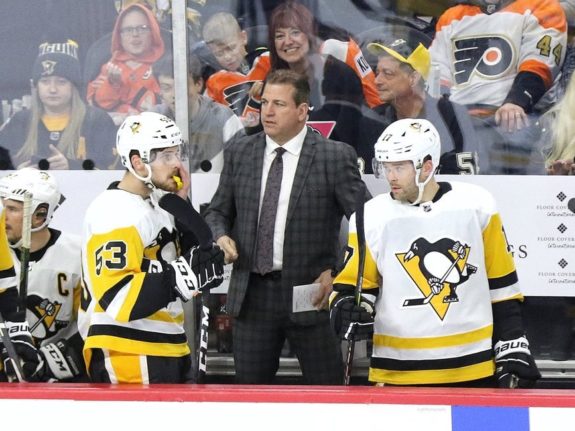
The Penguins would win the next four games to advance to the conference final.
1992 Division Semifinals
The two teams met once again the following year, this time in the first round as Pittsburgh began the hunt for its second-straight Cup.
Washington came out with a vengeance after a disappointing exit the previous year as the Capitals took the first two games on home ice. After Pittsburgh won Game 3, the Capitals took a commanding 3-1 series lead with a 7-2 win in Game 4.
In Game 5, the Penguins tightened up defensively, holding the Capitals to just four shots in the second period and Murphy’s power-play goal late in the second period clinched the win.
Kevin Stevens fired 12 shots on goal and two goals while Mario Lemieux piled up five points to lead the Penguins to a 6-4 win, evening up the series at three games apiece.
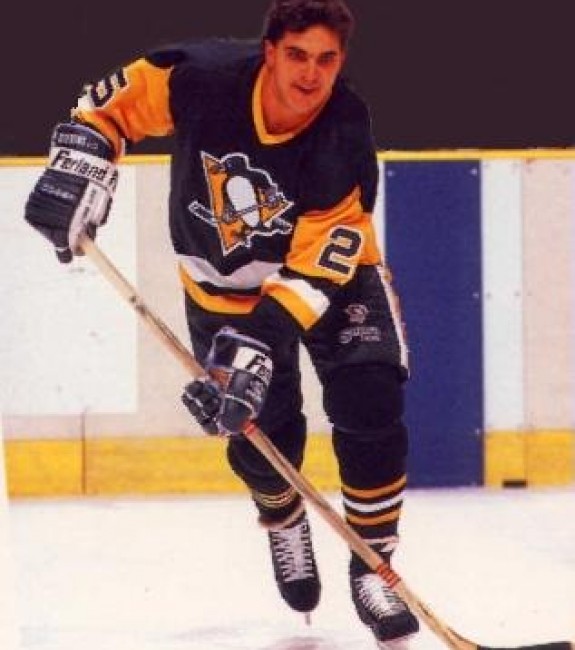
Pittsburgh’s defense showed up again in Game 7, limiting the Capitals to 18 shots and goals from Lemieux, Jaromir Jagr and Joey Mullen lifted the Pens to a 3-1 win.
It was the first time franchise history the Penguins climbed back from down 3-1 in a series and the 11th time a team did it in NHL history.
1994 Conference Quarterfinals
The year after the Penguins’ bitter-sweet 1992-93 season, Pittsburgh entered the 1994 playoffs as the second seed and the Northeast Division champions.
The Capitals, who were the seventh seed, came in after a season in which the front office fired head coach Terry Murray at the end of January. Murray was replaced by Jim Schoenfeld and the Capitals narrowly squeezed into the playoffs with a record of 39-35-10.
After the Capitals won Game 1 in Pittsburgh, the home team won every game in the series and Washington came out on top, four games to two.
The Capitals were helped in large part by Joe Juneau and Michal Pivonka, who each collected seven points in the series.
It would be the only time the Capitals beat the Penguins in a playoff series until 2018.
1995 Conference Quarterfinals
The Capitals seemed to carry some momentum into the 1995 playoffs after clinching their first series win against Pittsburgh and put up five or more goals in the first four games to take a 3-1 series lead.
Midway through the third period of Game 5, the Capitals held a 5-4 lead and looked to have the Penguins on the ropes. However, Stevens tied the game at the 11:42 mark to eventually force the game into overtime and Luc Robitaille’s OT winner kept the Penguins hopes alive moving to a Game 6.
Robitaille and Tomas Sandstrom each netted a pair of goals en route to a 7-1 romp in Game 6 before Ken Wregget’s 33-save shutout in Game 7 wrapped up the series. With the series win, the Penguins became the first team to have two 3-1 comebacks in playoff series against the same team.
1996 Conference Quarterfinals
The Caps and Pens met in the first round for the third-straight time and fifth time in the past six seasons in the 1996 playoffs.
Pittsburgh led 4-1 midway through the second period of Game 1, but the Capitals stormed back to score five unanswered goals to take the first game before eventually taking a 2-0 series lead.
The Penguins won Game 3, setting up a memorable and pivotal Game 4 in Washington. Pittsburgh trailed by two goals midway through the second period before tying things up and forcing overtime.
It would take four overtimes for either team to score. At 2:22 a.m., Petr Nedved snuck a wrist shot past Olaf Kolzig from the top of the circle to even the series.
Pittsburgh went on to win the next two games to advance to the conference semifinals.
2000 Conference Quarterfinals
Leading up to the summer of 1999, the Penguins were in danger of being forced to file for bankruptcy and possibly relocating to either Portland or Kansas City.
However, a group of investors led by Lemieux were able to purchase the franchise and keep the Penguins in Pittsburgh.
Later that season, Jagr, the Art Ross trophy winner with 96 points in the regular season, managed to squeeze Pittsburgh into the playoffs as a seventh seed.
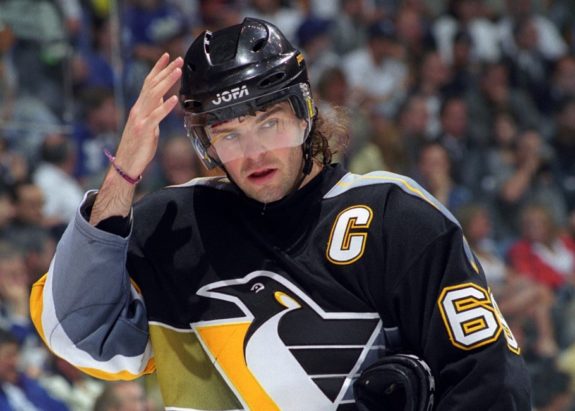
Jagr led the Pens in the first round matchup against the second-seed Capitals as well, tallying 10 points including the OT-winner in Game 2 as Pittsburgh won the series, four games to one.
2001 Conference Quarterfinals
The Penguins-Capitals rivalry really start to heat up in the 90s and early 2000s as the two teams met in the playoffs in back-to-back years for the fourth time in 2001.
Pittsburgh was coming off a season in which Lemieux came out of retirement and multiple players had career years.
Jagr, who compiled 52 goals and 121 points in the regular season, collected his fourth-straight Art Ross trophy while Alexei Kovalev and Martin Straka each piled up 95 points.
The Penguins held Washington to just two goals in the first three games of the series and eventually set up a series-clinching scenario on home ice, up three games to two in Game 6.
Game 6 went to overtime before Straka brilliantly stripped the puck of future-Penguin Sergei Gonchar and beat Kolzig to clinch the series.
Lemieux and Jagr teamed up for five goals and 13 points in the series, but it would be the last season Jagr spent in Pittsburgh. The 28-year-old was traded to Washington in the following offseason for three prospects.
2009 Conference Semifinals
After the departure of Jagr, the Penguins struggled for a couple of seasons until the franchise started to turn things around, drafting superstar Sidney Crosby in 2005.
Crosby led a young and hungry group to the finals in 2008 before losing to the Detroit Red Wings, but the Pens would make another run the following season.
Crosby and Washington’s Alexander Ovechkin went toe-to-toe all throughout the series the following year, including a trilling Game 2 in which each superstar notched a hat trick.
The thrilling series was capped off with a stellar Game 7 performance by Crosby and Marc-Andre Fleury as the Penguins routed Washington, 6-2, in the series deciding game.
Crosby and the Pens made it all the way back to the finals, beating Detroit in seven games for the franchise’s first Stanley Cup since 1992.
2016 Second Round
Heading into the 2016 playoffs, the Penguins were poised for a deep playoff run with Crosby and Evgeni Malkin at the top of their games, as well as recent addition Phil Kessel and the young and exciting goaltender Matt Murray.
After the Penguins took care of the Rangers in five games, the Penguins headed into the second round set to face Washington, which captured the President’s Trophy with 120 points, for the ninth time in franchise history.
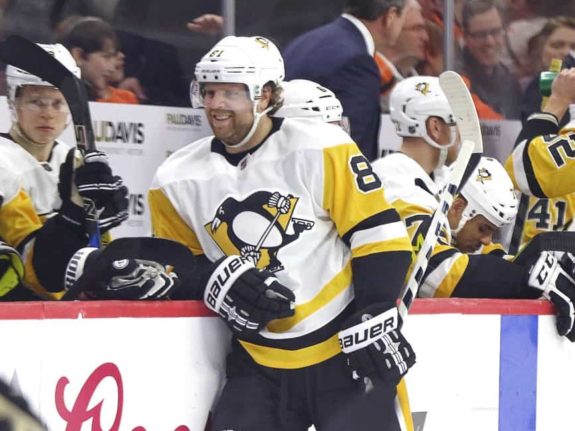
Washington’s T.J. Oshie shined in Game 1, notching a hat trick with the third goal being an overtime winner.
The Penguins survived one-goal games in the next two games before Patric Hornqvist’s overtime winner in Game 4 put Pittsburgh up three games to one.
Braden Holtby’s 30-save performance in Game 5 forced a Game 6 and Nick Bonino, center of the ‘HBK line’ which included Carl Hagelin, Kessell and Bonino, snuck home a series clinching overtime winner.
The Penguins carried the momentum all the way before the playoff run culminated with the fourth Cup in franchise history.
2017 Second Round
In 2017, it would be the fifth time these two teams met in back-to-back playoff years.
As the Penguins were coming off their fourth Stanley Cup in franchise history after the previous season, the Capitals were coming off a season in which they captured their second-straight President’s Trophy.
Each team came into the second round series with plenty of rest as Pittsburgh took care of Columbus in five games and Washington put Toronto on the golf links after six games.
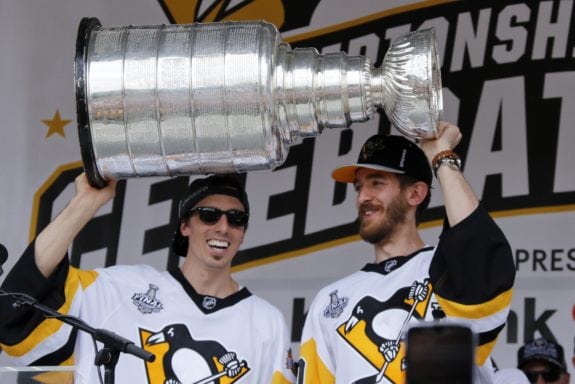
The Penguins held the Capitals to just two goals in each of the first two games to take a 2-0 series lead before a overtime thriller in Game 3 was ended by Kevin Shattenkirk.
A 3-2 win by Pittsburgh in Game 4 put the Penguins up 3-1 in the series until Washinton’s three-goal third period in Game 5 kept the series alive.
Washington handled Pittsburgh, 5-2, in Game 6 to force a series-deciding Game 7. Fleury found a vintage form of himself in Game 7, stopping all 29 shots Washington put on net to help the Penguins wrap up the series.
The Penguins went on to edge Ottawa in seven games in the next round before capturing the fifth Cup in team history with a six-game series win against Nashville.
2018 Second Round
The Pens and Caps met for the third straight season as Pittsburgh was on the hunt for its third Cup in as many seasons.
Pittsburgh came into the second round series against Washington a little drained as the Pens went six games with rival Philadelphia.
After Jake Guentzel led the Penguins’ to a come-from-behind win in Game 1, the Capitals took the next two games on the strength of Holtby’s strong play.
Guentzel’s two goals in Game 4 evened up the series, Washington’s offense was firing on all cylinders in Game 5 to force a series-deciding Game 6 in Pittsburgh.
Alex Chiasson scored for Washington in Game 7 before Kris Letang’s one-timer evened things up and eventually sent the game into overtime. At the 5:27 mark of overtime, the Capitals finally broke the ‘Penguins curse’ that had stricken the franchise since 1994 when Evgeny Nuznetsov tucked in the game-winner between Murray’s legs.
The Capitals rode the wave all the way to the Stanley Cup Final before beating the newly-formed Vegas Golden Knights in six games to capture the franchise’s first Stanley Cup.
I think sometimes we all learn more from our failures than we do our successes,” Sullivan said. “I think this group knows how hard it is to win in the playoffs. All the teams are really good. There’s a fine line between winning and losing. We haven’t tasted this in a long time, and that’s a credit to the group of players that is in that dressing room.
Penguins’ coach Mike Sullivan via NHL.com
Yeah, I guess it is fair to say that this rivalry has been one of the best in all of hockey. Hopefully, for the sake of Penguins and Capitals fans everywhere, the 2020-21 season will bring us another series to eat up.
Stay tuned to The Hockey Writers as the 12 Days of Hockeymas continues with the Penguins’ 10 highest point scorers.